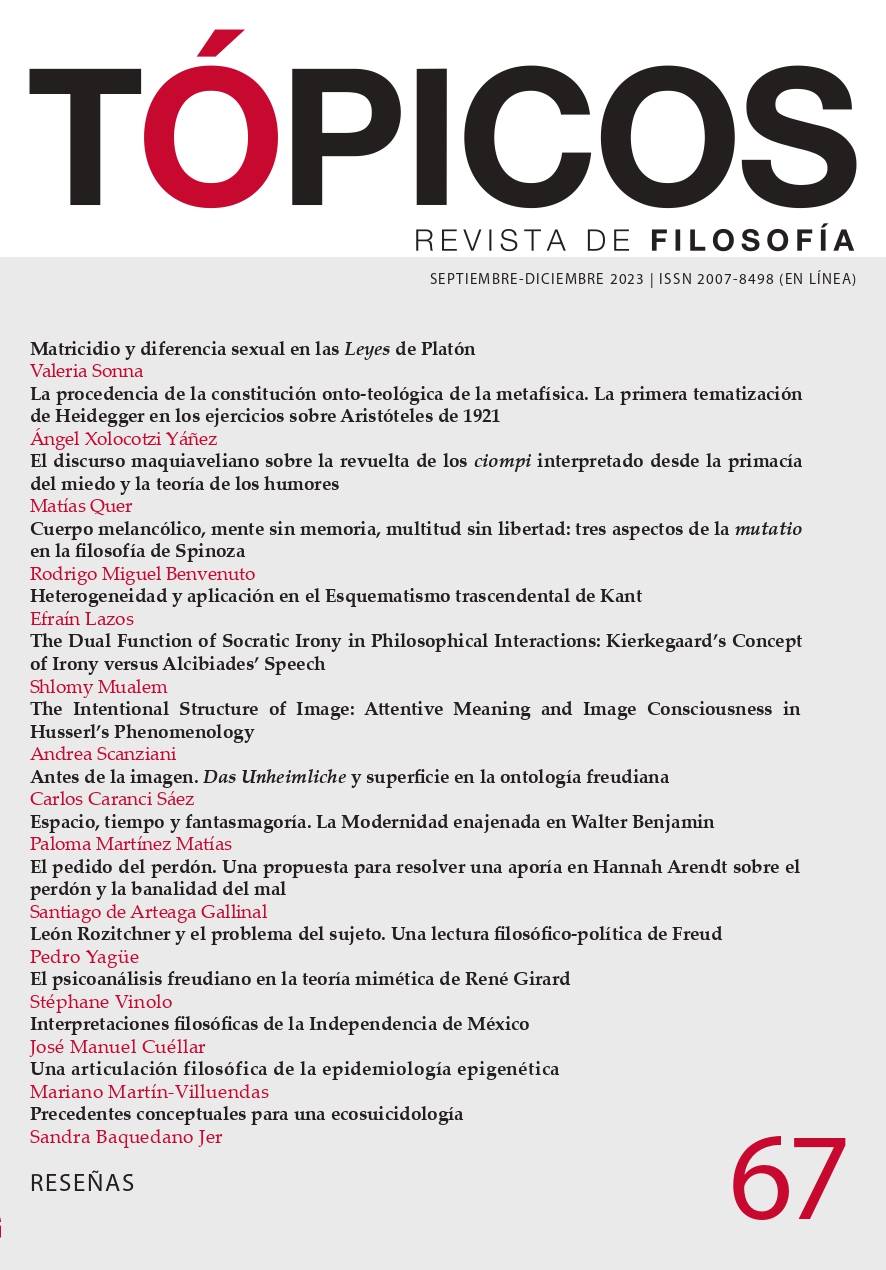Asking For Forgiveness. A Proposed Solution for an Aporia in Hannah Arendt on Forgiveness and the Banality of Evil
Published 2023-08-01
Keywords
- banality of evil,
- thinking,
- forgiveness,
- person
Copyright (c) 2023 Tópicos, Revista de Filosofía

This work is licensed under a Creative Commons Attribution-NonCommercial-NoDerivatives 4.0 International License.
How to Cite
Abstract
The article offers a solution to an aporia present in Hannah Arendt concerning the banality of evil and forgiveness. The banality of evil implies the abandonment of thought by an agent and the negation of personhood; thus, it can be stated that, in fact, there is nobody to be found in a particular action. The problem is that, for Arendt, the meaning of forgiveness is that it is directed at the redemption of the person from her past. Then, the aporia of the banality of evil and forgiveness is that there is nobody to forgive. The structural-phenomenological condition for the appearance of the person is the request for forgiveness, for it is only this that manifests the reconstitution of the person through thought and reopens the space of appearance that makes the emergence of forgiveness possible.
References
- Arendt, H. (1984). La vida del espíritu. R. Montoro Romero y F. Vallespín Oña (trads.). Centro de Estudios Constitucionales.
- Arendt, H. (1994). Understanding and Politics (The Difficulties of Understanding). En Essays in Understanding 1930-1954. (pp. 307-327). Schocken Books.
- Arendt, H. (2006). Eichmann in Jerusalem: A Report on the Banality of Evil. Penguin Books.
- Arendt, H. (2007a). Algunas cuestiones de filosofía moral. En Responsabilidad y juicio. (pp. 75-150). M. Candel (trad.). Paidós.
- Arendt, H. (2007b). El pensar y las reflexiones morales. En Responsabilidad y juicio. (pp. 161-184). F. Birulés (trad.). Paidós.
- Arendt, H. (2009). La condición humana. R. Gil Novales (trad.). Paidós.
- Baehr, P. (2010). Banality and Cleverness: Eichmann in Jerusalem Revisited. En R. Berkowitz, T. Keenan y J. Katz (eds.), Thinking in Dark Times: Hannah Arendt on Ethics and Politics. (pp. 139-142). Fordham University Press.
- Berkowitz, R. (2010). Solitude and the Activity of Thinking. En R. Berkowitz, T. Keenan y J. Katz (eds.), Thinking in Dark Times: Hannah Arendt on Ethics and Politics. (pp. 237-245). Fordham University Press.
- Bernstein, R. J. (2001). Arendt on Thinking. En D. Villa (ed.), The Cambridge Companion to Hannah Arendt. (pp. 277-292). Cambridge University Press.
- Bernstein, R. J. (2010). Is Evil Banal? A Misleading Question. En R. Berkowitz, T. Keenan y J. Katz (eds.), Thinking in Dark Times: Hannah Arendt on Ethics and Politics. (pp. 131-136). Fordham University Press.
- Hegel, G. W. F. (2003). Fenomenología del espíritu. W. Roces y R. Guerra (trads.). Fondo de Cultura Económica.
- Jankélévitch, V. (2005). Forgiveness. A. Kelley (trad.). The University of Chicago Press.
- Lavi, S. (2010). Crimes of Action, Crimes of Thought: Arendt on Reconciliation, Forgiveness, and Judgement En R. Berkowitz, T. Keenan y J. Katz (eds.), Thinking in Dark Times: Hannah Arendt on Ethics and Politics. (pp. 229-234). Fordham University Press.
- Madrid Gómez, M. (2008). Sobre el concepto de perdón en el pensamiento de Hannah Arendt. Praxis Filosófica, 26, 131-149.
- Passerin D’Entrèves, M. (2001). Arendt’s Theory of Judgement. En D. Villa (ed.), The Cambridge Companion to Hannah Arendt. (pp. 245-260). Cambridge University Press.
- Shuster, M. (2018). Hannah Arendt on the Evil of Not Being a Person. Philosophy Compass, 13(7). DOI: https://doi.org/10.1111/phc3.12504.
- Stern, M. (2020). Hannah Arendt: Thinking as Withdrawal and Regeneration of the World. En I. Snir (ed.), Education and Thinking in Continental Philosophy: Thinking against the Current in Adorno, Arendt, Deleuze, Derrida, and Rancière. (pp. 57-81). Springer.





